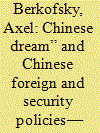| Srl | Item |
| 1 |
ID:
064581


|
|
|
|
|
| Publication |
Jul-Aug 2005.
|
|
|
|
|
|
|
|
|
|
|
|
|
|
|
|
| 2 |
ID:
149043


|
|
|
|
|
| Summary/Abstract |
The “China Dream” announced by Chinese President Xi Jinping’ in 2012 paints a very rosy picture of China under his seemingly undisputed leadership: China's economic and political rise will be beneficial to China and indeed the international community putting Beijing on top of the list of “peace-loving” countries. Reality, however, as it turned out over the last four years, is distinctively different as a number of countries in China's neighborhood and beyond can surely confirm. Indeed, Beijing unilaterally claiming and building civilian and military facilities on disputed islands in the South China Sea are arguably the very opposite of a peaceful contribution to world politics and security facilitated by the rhetorical hype of Xi's “Chinese Dream.” While outside observers can be excused for concluding that the “Chinese Dream” mantra is directed at the Chinese domestic audience to distract from the very many economic, environment and social problems within China, the consequences of Beijing's “dreaming” of re-gaining its former undisputed “Middle Kingdom” status in Asia are very much felt abroad. This, it is argued, could be the time when “dreams” turn into “nightmares” for those at the receiving end of Beijing's dream.
|
|
|
|
|
|
|
|
|
|
|
|
|
|
|
|
| 3 |
ID:
189277


|
|
|
|
|
| Summary/Abstract |
This article analyzes the quality of selected aspects and issues regarding relations between the German Democratic Republic (GDR) and China in the 1950s and early 1960s. How was Chinese dictator Mao Zedong’s Hundred Flowers Campaign perceived and interpreted in East Berlin, and why and until when was GDR leader Walter Ulbricht enthusiastic about Mao’s disastrous Great Leap Forward are among the questions this article will seek to answer. As it turned out, East German leaders’ assessments and newspaper reporting on Mao’s domestic and foreign policy and government propaganda did not in any way correspond with China’s on the ground realities. The East German authorities took Chinese propaganda and entirely false statistics and data on steel and agricultural production at face value and ordered its mouthpiece newspapers to do the same. The same was true for Chinese reporting and propaganda on Ulbricht’s decision to divide Berlin with a wall in 1961: misleading and nonsensical reporting in support of a fair-weather friendship, which in the wake of the Sino-Soviet Split in the early 1960s would turn into enmity (as ordered by Moscow).
|
|
|
|
|
|
|
|
|
|
|
|
|
|
|
|
| 4 |
ID:
135934


|
|
|
|
|
| Summary/Abstract |
The EU calls itself a “soft power,” making “soft power” contributions to Asian security. That is undoubtedly what the EU is and does in Asia and the track record of European contributions to Asian peace and stability through economic and financial as well as development aid and technical assistance over the decades is not unimpressive. As will be shown below, over recent years Brussels and the Union's individual member states have sought to increase their involvement and role in Asian “hard security,” attempting to get rid of its reputation of being security a “free-rider” enjoying but not sharing the burden of US regional security guarantees. While the EU will continue to be a “hard security” actor in Asian security within limits, it is advised to concentrate its security cooperation with like-minded partners such as Japan and the US as opposed to hoping that talking to Beijing on regional or global security issues produces tangible results. As will be shown below, it clearly does not as Beijing continues to conduct very assertive and at times aggressive regional foreign and security policies insisting on the “principle of non-interference” in Chinese domestic and foreign policies. Consequently, EU influence on Chinese foreign and security policies in general and its increasingly aggressive policies related to territorial claims in the East China and South China Seas will continue to exist on paper and paper only.
|
|
|
|
|
|
|
|
|
|
|
|
|
|
|
|